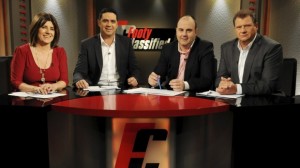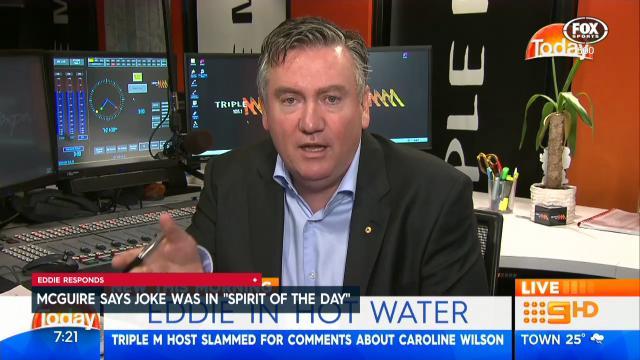In all the noise surrounding Eddie McGuire’s public remarks about holding veteran Australian sport commentator Caroline Jones underwater, inviting onlookers to ‘bomb’ her in so doing, I’ve been wondering what’s really going on his mind.
I’ve heard plenty coming out of the media personality and Collingwood Football Club president’s self-justifying lips and, even at the excruciating moment of his grudging apology, it’s not encouraging.
I’ve also been pondering what – if anything – would change in his mind if he were made a public example of and pressured to step down as president or from any of his various high-profile media gigs. I’m suspecting not much; and although I’m hoping a public drubbing will prove me wrong, I’m not holding my breath.
In Eddie McGuire’s world of professional football, elite sports people have access to a battery of specialists to help manage the physical and psychological issues that come with stardom and professional sport.
But what sort of process do leaders like Eddie McGuire go through over time to evolve their attitudes and behaviours into the leadership behaviours we expect of them today, consistent with and worthy of the goals and aspirations of the programs they auspice?
From my perspective, it seems that Eddie McGuire has gone through a self-reinforcing life and career journey back into deeply engrained values he started off with, courtesy of a professional and social environment that’s supported this trajectory.
It’s reinforced to me that it’s not enough to be at the head and centre of transformative organisational programs and cultural shifts, as McGuire is.
‘This is the real embarrassment for football…that its cult of personality and craven worship of bullies makes rank hypocrisy like this its default philosophical setting.’
McGuire’s actions this week reminded me of an acquaintance, a former general manager of a niche global telco, who put in enormous effort to create a pleasant work environment for his team and spearheaded the company push into North East Asia. But in his own words, he was ‘determinedly monocultural’, poor at adjusting his cultural behaviours and found the Australian cultural courtesy of Welcome to Country ‘a bit of a w*nk’. While he did not bully and demean, he displayed rigid attitudes and resistance to adjusting them. As a result, there were deep discrepancies between key actions and his engrained attitudes. In practical business terms, this was manifested in frustrations with the globalisation of the business.
From my perspective, I’m struck that an individual – a group, a culture – is capable of a values duality in which one set of actions and professed values can operate separately from another. No wonder our progress on issues like cultural discrimination in the workplace is frustratingly slow.
It bothers me that in the rush to – rightly – make an example of Eddie McGuire, we risk overlooking people’s need to commit to a long process towards a more wholesome values system and associated behaviours.
Make no mistake: McGuire’s repeat crossings of the line merit being made an example of.
We run the risk of disregarding the need to address this duality that we have seen in Eddie McGuire – with Caroline Wilson, with Sydney Swans star footballer Adam Goodes. Such duality means the value of a person or group is entirely relative and negotiable. And there is only a spurious connection between one’s own values systems and programs one supports that aim to end structural discrimination…or simply achieve business or social goals.
The Guardian’s Russell Jackson frames this duality bluntly:
“This is the real embarrassment for football – not that it’s incapable of involving women, because it now does so in performative and often crowd-pleasing ways, but that its cult of personality and craven worship of bullies makes rank hypocrisy like this its default philosophical setting.’
Elite business professionals and public figures – among whom I’d include the likes of Eddie McGuire – have started to recognise that coaching and ongoing professional support are no longer considered ‘deficit’ or ‘remedial’ activities; but rather, a valuable undertaking that supports them, like elite sports people, to identify their blind spots, transform their attitudes and improve their performance.
Is this what influential entertainment figures and leaders like McGuire require?
If so, is that what they’re doing? If not, why not?
Let’s suppose that McGuire is made an example of and asked to step down from the presidency of Collingwood Football Club (the club I support) after 20 powerful years.
How is that going to transform him? How is that going to transform the culture?
 The public outrage has been compelling. Not for the first time, McGuire has felt goaded into a corner with no recourse but to say ‘sorry’. Does this mean the culture of impunity is eroding? I hope so. Does this apology – would resignations – address McGuire’s underlying attitudes and values? Maybe not his. Would such a gesture mark a cultural watershed? Hard to tell. There’s a long way to go. In the meantime, it would be a pity if, rather than drawing a line in the sand under approaches that just don’t work to end discrimination, we ended up undermining our best intentions.
The public outrage has been compelling. Not for the first time, McGuire has felt goaded into a corner with no recourse but to say ‘sorry’. Does this mean the culture of impunity is eroding? I hope so. Does this apology – would resignations – address McGuire’s underlying attitudes and values? Maybe not his. Would such a gesture mark a cultural watershed? Hard to tell. There’s a long way to go. In the meantime, it would be a pity if, rather than drawing a line in the sand under approaches that just don’t work to end discrimination, we ended up undermining our best intentions.
I hold no truck with bullying behaviours, self-justification or leadership cultures of impunity around bias and discrimination. However, the strong public reaction to Eddie McGuire’s patent unawareness of his own distorted values and behaviours points to our tendency to react rather than act.
Make no mistake: McGuire’s repeat crossings of the line merit being made an example of. Unlike Foreign Minister Julie Bishop, I don’t believe that the outrage over his ‘silly remarks’ is overstated and a unwarranted distraction from ‘important issues of the day’. This issue is representative, Minister. McGuire’s behaviours reinforce those social codes that permit covert and overt discrimination, reinforce stereotyping and do nothing to change the deep and corrosive values systems that underlie them. He has willfully eroded his right to occupy positions of public influence.
What I do advocate, however, is a response in which we demand that public figures like Eddie McGuire – neither more nor less than any other leader in business, government, education or the not-for-profit sector – go through some kind of process in which they have to work through and out of these values systems and demonstrate transformed behaviours.
And I don’t mean through empty hyperbole or figureheading grand initiatives. I mean through boring, incremental, measurable change to the way they communicate with others.
It’s clear to my mind that McGuire’s support for the fantastic initiatives in which the AFL has provided true leadership does come from a set of values but these aren’t aligned with those values that this misogynistic discourse comes from. Until McGuire is empowered to reach deeply and gradually change his values, it doesn’t matter what programs he puts his name to or how much justified public indignation gets directed at him.


